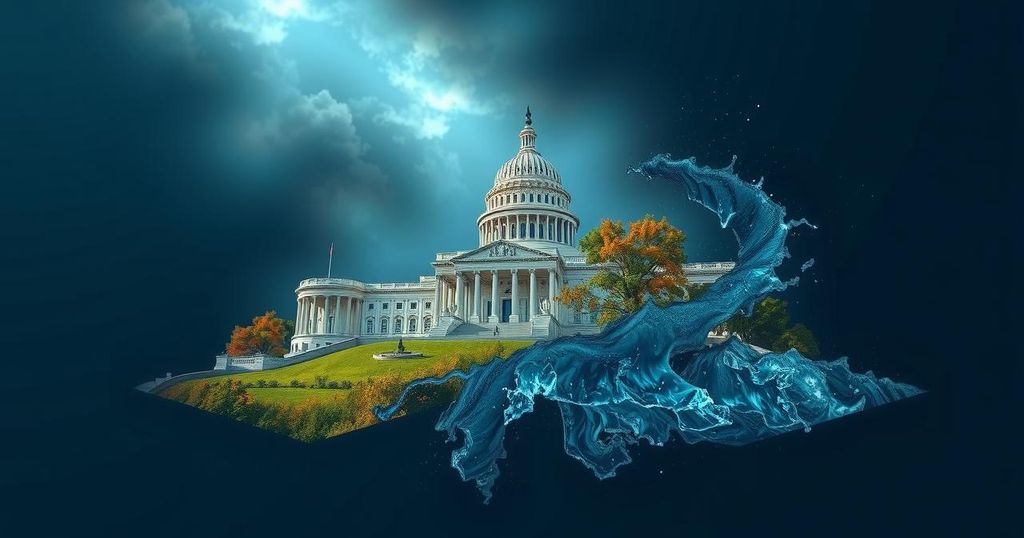The Alarming Connection Between Climate Change and Authoritarianism
The article explores the disturbing correlation between climate change and the rise of authoritarian regimes, using Super Typhoon Yolanda as a case study. It highlights how natural disasters can facilitate the consolidation of power by strongman leaders like Rodrigo Duterte in the Philippines. Research suggests that increasing climate crises lead to declines in democratic governance, reinforcing societal fears and negative attitudes towards marginalized groups. While the trend is troubling, there is hope for liberal democracies to respond effectively through reform and collective action.
In November 2013, the Philippines experienced Super Typhoon Yolanda, one of the strongest tropical cyclones ever recorded, with devastating winds of up to 235 miles per hour and catastrophic storm surges. The storm officially resulted in over 6,300 fatalities, although the true number was likely far greater. Amidst this disaster, then-Mayor Rodrigo Duterte captured national attention by traveling to the affected areas, vowing that any looters would be shot. After winning the presidency in 2016, Duterte’s administration was marked by a violent war on drugs and the erosion of democratic norms. Duterte’s rise to power highlights a disturbing pattern where catastrophic climate events create opportunities for authoritarian figures to consolidate power by exploiting public fears and vulnerabilities. Across the globe, similar leaders have gained traction, often capitalizing on societal unrest exacerbated by environmental changes. For instance, Prime Minister Narendra Modi of India has fostered anti-Muslim sentiments, and former Brazilian President Jair Bolsonaro attempted to weaken Indigenous land rights. As climate change triggers more severe natural disasters, the political landscape risks shifting toward authoritarianism. Research indicates that such disasters can lead to a decrease in democratic governance, as people turn to leaders who promise stability and decisive action in times of crisis. A 2022 study focused on island nations highlighted that hurricanes correlate with a significant decline in democracy scores, suggesting the emergence of persistent autocracies termed “storm autocracies.” Psychological studies have also demonstrated that climate threats can exacerbate negative attitudes towards marginalized groups, reinforcing societal divisions. As individuals grapple with their insecurities regarding climate change, the allure of strongman leaders who pledge to restore safety becomes palpable, despite many supporters denying the reality of climate change. While there is a clear link between climate change and authoritarian tendencies, it remains imperative to focus on the potential for liberal democracies to respond effectively. Suggestions for strengthening democratic institutions include reforming legislative processes to facilitate climate action and fostering collective movements centered around environmental justice that transcend traditional identities. Ultimately, individuals must resist pessimism regarding the intersection of climate change and authoritarianism. The future trajectory of global politics is not predetermined but rather shaped by collective action and engagement.
The article discusses the intertwined relationship between climate change and the rise of authoritarianism, particularly in the context of recent natural disasters. It draws upon the case of Super Typhoon Yolanda in the Philippines and the subsequent actions of Rodrigo Duterte, highlighting how leaders can exploit crises to consolidate power. The rising trend of authoritarianism is evident globally, as political figures leverage instability caused by climate change to bolster their regimes. Existing research, including psychological studies, indicates that societal reactions to climate threats often tilt towards support for autocratic governance as citizens seek security in strong leadership. The implications of these dynamics reveal the urgent need for robust democratic responses to counteract authoritarian tendencies exacerbated by climate change.
The interplay between climate change and authoritarianism presents a critical threat to democracy globally. The case of Super Typhoon Yolanda emphasizes how environmental crises can usher in strongman leaders who capitalize on fear and vulnerability. Though this trend is concerning, there is potential for liberal democracies to counteract these movements through systemic reforms and collective climate action. The future of governance amid climate change will depend on society’s capacity to unite against authoritarian impulses and advocate for democratic resilience.
Original Source: www.fastcompany.com




Post Comment